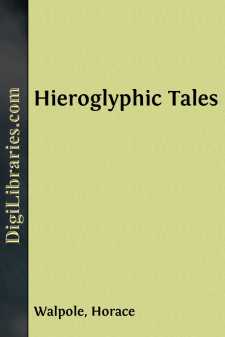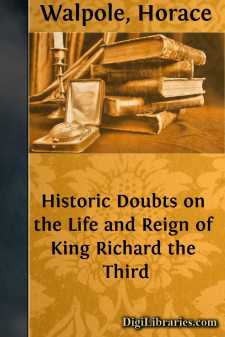Categories
- Antiques & Collectibles 13
- Architecture 36
- Art 48
- Bibles 22
- Biography & Autobiography 813
- Body, Mind & Spirit 142
- Business & Economics 28
- Children's Books 17
- Children's Fiction 14
- Computers 4
- Cooking 94
- Crafts & Hobbies 4
- Drama 346
- Education 46
- Family & Relationships 57
- Fiction 11829
- Games 19
- Gardening 17
- Health & Fitness 34
- History 1377
- House & Home 1
- Humor 147
- Juvenile Fiction 1873
- Juvenile Nonfiction 202
- Language Arts & Disciplines 88
- Law 16
- Literary Collections 686
- Literary Criticism 179
- Mathematics 13
- Medical 41
- Music 40
- Nature 179
- Non-Classifiable 1768
- Performing Arts 7
- Periodicals 1453
- Philosophy 64
- Photography 2
- Poetry 896
- Political Science 203
- Psychology 42
- Reference 154
- Religion 513
- Science 126
- Self-Help 84
- Social Science 81
- Sports & Recreation 34
- Study Aids 3
- Technology & Engineering 59
- Transportation 23
- Travel 463
- True Crime 29
The Letters of Horace Walpole, Earl of Orford - Volume 4
by: Horace Walpole
Categories:
Description:
Excerpt
Letter 1 To Sir David Dalrymple.(1)
Arlington Street, Jan. 1, 1770. (page 25)
Sir, I have read with great pleasure and information, your History of Scottish Councils. It gave me much more satisfaction than I could have expected from so dry a subject. It will be perused, do not doubt it, by men of taste and judgment; and it is happy that it will be read Without occasioning a controversy. The curse of modern times is, that almost every thing does create controversy, and that men who are willing to instruct or amuse the world have to dread malevolence and interested censure, instead of receiving thanks. If your part of our country is at all free from that odious spirit, you are to be envied. In our region we are given up to every venomous mischievous passion, and as we behold all the public vices that raged in and destroyed the remains of the Roman Commonwealth, so I wish we do not experience some of the horrors that brought on the same revolution. When we see men who call themselves patriots and friends of liberty attacking the House of Commons, to what, Sir, can you and I, who are really friends of liberty, impute such pursuits, but to interest and disappointed ambition! When we see, on one hand, the prerogative of the Crown excited against Parliament, and on the other, the King and Royal Family traduced and insulted in the most shameless manner, can we believe such a faction is animated by honesty or love of the constitution? When, as you very sensibly observe, the authors of grievances are the loudest to complain of them, and when those authors and their capital enemies shake hands, embrace, and join in a common cause, which set can we believe most or least sincere? And when every set of men have acted every part, to whom shall the well-meaning look up? What can the latter do, but sit with folded arms and pray for miracles? Yes, Sir, they may weep over a prospect of ruin too probably approaching, and regret a glorious country nodding to its fall, when victory, wealth, and daily universal improvements, might make it the admiration and envy of the world? Is the Crown to be forced to be absolute? Is Caesar to enslave us, because he conquered Gaul? Is some Cromwell to trample on us, because Mrs. Macaulay approves the army that turned out the House of Commons, the necessary consequence of such mad notions? Is eloquence to talk or write us out of ourselves? or is Catiline to save us, butt so as by fire? Sir, I talk thus freely, because it is a satisfaction, in ill-looking moments, to vent one's apprehensions in an honest bosom. YOU Will not, I am sure, suffer my letter to go out of your own hands. I have no views to satisfy or resentments to gratify. I have done with the world, except in the hopes of a quiet enjoyment of it for the few years I may have to come; but I love my country, though I desire and expect nothing from it, and I would wish to leave it to posterity, as secure and deserving to be valued, as I found it. Despotism, or unbounded licentiousness, can endear no nation to any honest man. The French can adore the monarch that starves them, and banditti are often attached to their chief; but no good Briton can love any constitution that does not secure the tranquillity and peace of mind of all....







